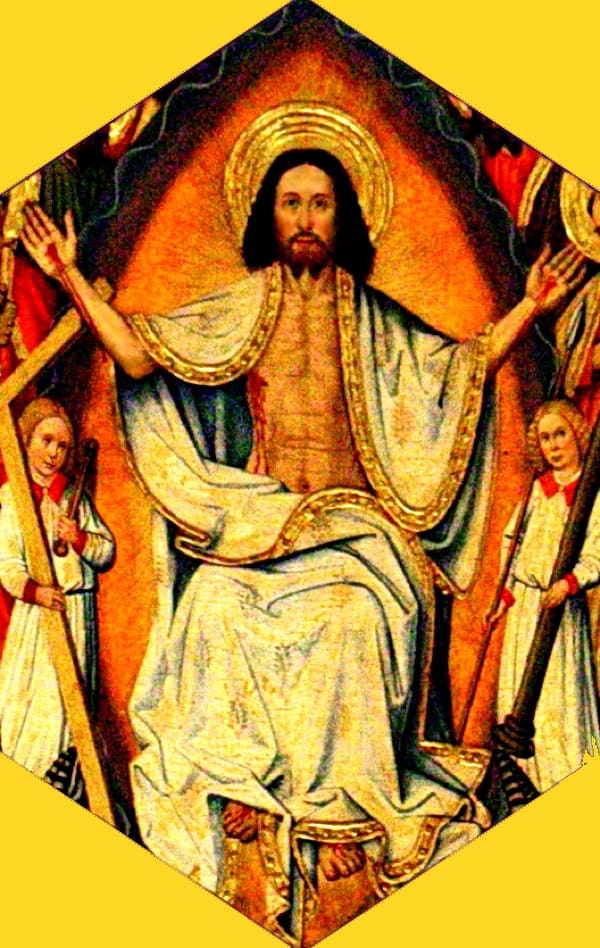Christ is King … or is He?
(Solemnity of Our Lord Jesus Christ, King of the Universe)

Today we celebrate the Solemnity of Christ the King. A relatively new festival in the Church’s liturgical calendar, this feast was established by Pope Pius XI’s encyclical Quas Primas, less than one hundred years ago, in 1925. Today, we rejoice that He is the firstborn of all creation and that all things exist in Him. We acknowledge Christ as King of the Universe, pay homage to Him and think about how He will come at the end of time as just Judge and Lord of all. As the last Sunday in our Church year, it makes us focus on the four last things: death, judgment, Heaven, Hell … and oh, no! Advent starts next Sunday and Christmas will soon be here and there isn’t much time left. And, in very short order, we forget all about Christ being King.
What becomes king, then, is the shopping, partying, Christmas cards, our lives, our expectations, self-pity, the drama, our egos, besting each other in all sorts of ways (even spiritually), ignoring, or paying lip service to, the plight of the less fortunate, and hurrying to and fro without hardly a moment to truly contemplate Christ our King, even though He is going to be born soon at Christmas.
Why does this happen? It’s because, in general, Jesus, who loves us beyond all measure, is, sadly, not really King – not of our hearts at least.
Our Lord told us that the Kingdom of Heaven is at hand. It is within us. If our treasure is with Him, that’s where our hearts will be. If we find our treasure in the world, well guess what? Our hearts will be with the world. To what avail? We already know no one can serve two masters. So, what does it profit us to master and gain the entire world if, by doing so, we forfeit eternal life?
And so, we are to first seek the Kingdom of God and then all things will be given us besides. When we don’t put God first in our lives, it is inevitable that He will not be first in our hearts and He will not be enthroned there. His Kingdom will not have come to us … and neither will His will be done on our personal earth, in our very selves.
Today’s solemnity is a wonderful opportunity to take stock of whether or not Jesus really is our King. Are we aligned with Him? Are His ways our ways? Do we accept His teachings trustingly like a humble child (cf Mark 10:15) and follow them, or do we pick and choose our own gospel because we can’t stand to follow His? Who do we say that He is, anyway? Have we internalized His Kingship in our hearts or do we merely say He is King because we’ve been told He is? Can we say it of our own accord? (cf John 18:34). And then, do we follow through by loving and serving Him and neighbor with the same love with which He loves us (cf John 15:12)? Do we feed the hungry, clothe the naked, welcome the stranger, visit the imprisoned (cf Matthew 25:31-46), lay down our lives for others (cf John 15:13)? Are we merciful and forgiving? Are we faithful in small things? (cf Matthew 25:21, 23; Luke 16:10; Colossians 3:23). Do we truly consider our neighbor? These are tough questions; but, answering them honestly and changing our hearts will help put us on the Lord’s royal road.
To travel on that Way, we must have a relationship with God. Think of how we relate to others by spending time with them and getting to know them, enriching our friendship through our common experiences and goals. We converse. We listen. We share our ups and downs. Sometimes we just bask in quiet moments and enjoy each other’s presence. We work together and are there for each other. We trust them and they trust us. These are some elements of good relationship with friends and family. Likewise, they are components of a good relationship with Christ, which begins with and is supported by prayer, that fancy word for communication and relationship with this great God who, as St. Augustine noted, is closer to us than we are to ourselves.
Christ’s Kingdom is not of this world. And, while we are heirs to that Kingdom, we are also His subjects. Therefore, whoever serves Him must follow Him in order to be where He is (cf John 12:26).
Where is He going? Where He reigns … first from the mercy seat of the Cross, then through that narrow gate and, having prepared a place for us, to the right hand of the Father.
But, we are not strong enough, wise enough, smart enough, or clever enough (insert whatever you like here) to follow Him on our own. So, thankfully, not only is the Kingdom of God within us, it is also among us here and now (cf Luke 17:21). It is, as St. Elizabeth of the Trinity was fond of saying, “Eternity begun and in progress.” Christ gave the keys of that Kingdom to St. Peter, in spite of his sins. Likewise, it is the Church, as the Bride of Christ and keeper of that Kingdom here on earth, who provides us with helps to put out into the deep (cf Luke 5:4) and to be on the Way (cf John 14:31): in the sacraments, in particular penance and the Eucharist, in the Holy Sacrifice of the Mass and through adoration of the Blessed Sacrament, by the Magisterium and the community of the faithful. We are exhorted to corporal and spiritual works of mercy, to virtue and holiness of life, to give of ourselves, to do whatever He says … just as we’ve been enjoined to do by our Blessed Mother Mary.
Let us, then, ask the Holy Spirit to help us! Let us enlist the prayers of the saints and angels and each other in this quest. Time is short; and, our life this side of eternity passes by quickly. If we haven’t yet enthroned Christ in our hearts, let’s do so now while we still can. If He is truly our King, let us strengthen and deepen our resolve to fully and lovingly trace His steps on His Sovereign highway in order to be with Him someday in Heaven. The coming season of Advent is the perfect time to prepare the way of the Lord … and follow where He leads. May we all be blessed to do so!
Liz Estler,
Editor,
Catholic Spiritual Direction
spiritualdirection.com
+
Art for this post on Christ is King … or is He?: Modified detail of Taula del Judici Final del “Retaule de la transfiguració” [Table of the Final Judgment of the Altarpiece of the Transfiguration], Jaume Huguet, between 1466 and 1475, CCA 3.0 Unported, PD-US author’s life plus 100 years or less, Wikimedia Commons.





